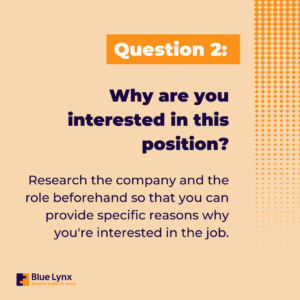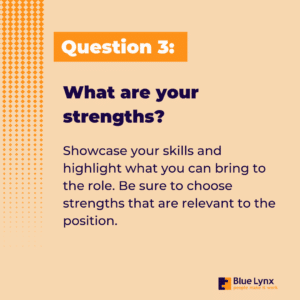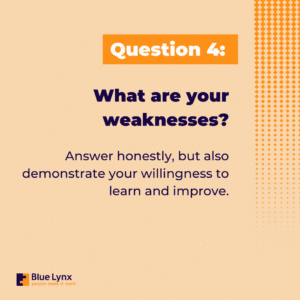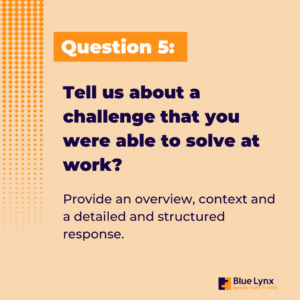
Job interviews are an essential aspect of the hiring process, and they can be a daunting experience for many job seekers. But what if we told you that there’s a hack that can help you ace your next interview?
Being prepared for a job interview is important as it shows your interest in the position and makes a great first impression. When you are well-prepared, you demonstrate that you’ve done your due diligence and have taken the time to understand what it entails. Furthermore, a well-prepared candidate appears more confident, articulate and knowledgeable.
It also helps you to anticipate and prepare for difficult questions: By researching the company and the job, you can anticipate the types of questions that you may get and prepare thoughtful responses that demonstrate your qualifications and fit for the job.
Overall, being prepared for a job interview is crucial if you want to increase your chances of landing it.
There are some common interview questions that you can prepare in advance to increase your chances of landing the job of your dreams. In this article, we’ll explore seven of the interview questions that you can expect to face most often in 2023.
Can you tell us a little about yourself?
Understanding why people ask a particular interview question is key to crafting an impressive answer.
This question is almost always the first question that’s asked in an interview. It’s an opportunity to introduce yourself and give the interviewer a sense of who you are.
This question is also purposed to help ease into the actual interviewing process, especially for less experienced recruiters. What’s more, it can help inform the direction of the interview and facilitate a smooth flow of conversation. If answered well, the interviewers will get to know you better and assess your fit for the job based on both hard and soft skills. This is a great opportunity to showcase your communication skills, and ability to connect with others and present yourself professionally.

Keep your response concise and focused on your professional experiences, skills, and accomplishments. Avoid sharing personal details or unrelated hobbies.
One potential response could be: Sure, I’d be happy to share a bit more about myself. My name is [Your Name], and I’m excited to be interviewing for this position. I have a degree in [Your Degree] from [Your University] and have worked in [Your Industry] for [Number of Years] years. In my current role as [Your Current Role], I have been responsible for [Your Key Responsibilities].
Outside of work, I enjoy [Your Hobbies or Interests], which I find helps me maintain a healthy work-life balance. I am also committed to continuous learning and development and have attended workshops and training sessions related to [Your Skills or Industry].
Overall, I am passionate about [Your Industry or Field] and am excited about the prospect of bringing my skills and experience to this role. I believe that my [Your Key Skills or Qualifications] make me a strong candidate for this position, and I am eager to discuss how I can contribute to the success of this company.
Why are you interested in this position?
This question is designed to assess your level of interest in the position and the company.
Take your time to research the company and the role before the interview so that you can provide specific reasons why you’re interested in the job. This could be the company’s reputation, opportunities for growth and development, or the chance to work with a particular team or project.
When applying for a job, it’s crucial to showcase your passion and motivation for the position to the interviewer. Ultimately, If you’re not passionate about the role, you may want to reconsider applying for it.
Here’s an example answer:
Thank you for asking. I’m very interested in this position because I believe that it is an excellent match for my skills and experience, and aligns well with my career goals. I’ve done some research on the company and the role, and I’m impressed by what I’ve seen so far.

I’m excited about the company’s mission and values, and I believe that this position would provide me with an opportunity to contribute to the success of the company while also allowing me to grow and develop my skills.
Additionally, I’m drawn to the specific responsibilities of this role, such as [list a few specific responsibilities that you find appealing]. These responsibilities align with my experience and interests, and I’m confident that I could excel in this role.
Overall, I’m very excited about the opportunity to work for this company and contribute to its success, and I believe that this position is the perfect next step in my career.
Essentially, you aim to show your enthusiasm for the position and the company. By highlighting your relevant experience and passion for the role, you can set yourself apart as a strong candidate for the job.
What are your strengths?
This question is an opportunity for you to showcase your skills and highlight what you can bring to the role.
Aim to choose strengths that are relevant to the position that you are applying for. If you’re applying for a marketing role – spotlight your creativity, communication skills, and ability to analyse data with a critical eye.
A generally good practice is to thoroughly review the job description before the interview. This will enable you to discuss the “Must Have” or “Required” skills as part of the conversation about your strengths.

An example answer could look like this: “When asked about my strengths, I tend to focus on my ability to collaborate well with others, my strong problem-solving skills, and my attention to detail. I value teamwork immensely, and I believe that by working together, we can achieve more as opposed to working individually.
I am always open to others’ perspectives and ideas and I proactively contribute with my thoughts. My previous experiences have allowed me to develop a good critical thinking approach. What is more, I am confident in my ability to analyse complex situations and find effective solutions whilst assessing all relevant factors.
Lastly, I take great pride in my attention to detail. I understand that small errors can have a detrimental impact on the outcome. Therefore, I always make sure to thoroughly review my work. Overall, I believe that my strengths in collaboration, problem-solving, and attention to detail make me a valuable asset to any team.
What are your weaknesses?
When asked about your weaknesses during a job interview, it is important to answer honestly, but also demonstrate your willingness to learn and improve. Here are some tips for answering this question effectively:
- Choose a weakness that is not directly related to the job you are applying for.
For example, if you are applying for a job in customer service, do not mention that you have difficulty speaking to customers.
- Be honest and specific
However, make sure you don’t dwell on it. Instead, focus on how you are working to improve it. For example, you could say something like, “One area I am working to improve is my public speaking. I have joined a local educational organisation and have been practising regularly to build my confidence.”

- Show that you are proactive in addressing your weakness.
Discuss steps you are taking to overcome it, such as taking a course, seeking mentorship, or practising on your own.
- Emphasise your strengths
And most importantly, how they balance out your weakness. For example, you could say, “While public speaking is not my strongest area, I excel in research and analysis, which allows me to prepare thoroughly for presentations and deliver a clear message.”
- Be confident and positive in your response
Remember, everyone has weaknesses, and the interviewer is not looking for perfection, but rather for candidates who are self-aware and willing to learn and grow.
Tell us about a challenge that you were able to solve at work.
When asked to talk about a challenge that you were able to solve at work during a job interview, it’s important to provide a detailed and structured response.
The best way to do that is to provide context. Start by providing a brief overview of the challenge and the context in which it occurred. This will help the interviewer understand the situation and the specific problem you were facing.
Next, describe your approach and explain the steps you took to address the challenge. Be sure to highlight any creative or innovative solutions you developed.
What about your skills?
Discuss the skills you used or developed during the process. This could include things like problem-solving, communication, teamwork, leadership, or other relevant ones.
What was the outcome?
Share the positive outcome of your efforts, including any measurable results. This could be an improvement in efficiency, increased revenue, or positive feedback from colleagues or customers.
What did you learn from this experience?
Finally, reflect on what you learned from the experience and how you have applied those lessons in your work since. This shows that you are adaptable, reflective, and constantly seeking to improve.
Example Response:
One challenge I faced in my previous job was a major project that was behind schedule and over budget. To address this, I organised a team meeting to identify the root cause of the issue. We realised that there were communication breakdowns between different departments. Those were leading to duplication of work and missed deadlines. To solve this, I set up a system of regular team meetings and check-ins to ensure that everyone was on the same page and that issues were addressed promptly.
As a result of these changes, we were able to get the project back on track and ultimately completed it under budget. This experience taught me the importance of effective communication and project management skills, and I have continued to apply those lessons in my work since then.
Why should we hire you?
When asked, “Why should we hire you?” during a job interview, it’s important to provide a confident and well-thought-out response.
- Highlight your strengths
This is an opportunity to showcase your unique skills and strengths that make you the best candidate for the job. You can mention specific accomplishments or experiences that demonstrate your abilities.
- Show how you will add value
Make sure to emphasise how you will contribute to the company’s goals and objectives. This could be through your expertise, experience, or enthusiasm for the role.

- Research the company
By researching the company and its culture, you can tailor your response to align with its values and mission. This shows that you are interested in the job and have done your homework.
- Be confident
Speak with confidence and conviction. Show the interviewer that you believe you are the right fit for the job and are excited about the opportunity.
Here’s an example response:
“Based on my experience in this industry and my understanding of the company’s goals and values, I believe I would be a great fit for this position. I have a track record of successfully managing projects and teams, and I am confident that I can bring my skills and expertise to help the company achieve its objectives. What’s more, I am passionate about this industry and I believe my enthusiasm and drive would make me a great asset to the team.”
Do you have any questions for us?
At the end of the interview, the interviewer will likely ask if you have any questions. Always prepare a few questions in advance. This shows that you have done your research and are genuinely interested in the role and the company. Ask about the company culture, its mission and vision, opportunities for growth, or specific projects that the team is working on.
This is a good opportunity to ask any clarifying questions if you have any doubts about the job responsibilities or other aspects of the role that you are unsure about.
Focus on the future – ask about the company’s plans for the future and how the position fits into those plans. This shows that you are interested in the long-term growth of the company.
Lastly, It’s generally best to avoid asking about salary and benefits during the first interview. This can come across as presumptuous and may give the impression that you are more interested in the compensation than the job itself.
Here are some example questions you could ask:
Can you tell me more about the company culture and how employees work together?
What are the main goals for the company in the next year or two?
Can you describe the typical career path for someone in this role?
How does the company foster professional development and growth for its employees?
Remember, asking thoughtful questions not only shows your interest in the company but can also help you gain a better understanding of the role and whether it’s a good fit for you.
To sum it up
Job interviews can be daunting, but by preparing for the most common questions, you can increase your chances of success.
Our tips on how to answer the most common job interview questions emphasise the importance of preparing beforehand and practising your responses. Make sure you focus on your strengths and how they align with the company’s needs when answering questions such as “Why should we hire you?” and “What are your greatest strengths?”.
When answering questions about weaknesses, go ahead and acknowledge them. As long as you explain how you are working to improve, you’ll make a positive impression. For the question “Tell me about yourself,” you can provide a brief overview of your relevant experience and skills. Always ask thoughtful and well-prepared questions, and when given the opportunity, show your genuine interest in the position and company.
Lastly, remember to do your due diligence about the company and the role. Be sure to choose relevant examples when answering questions, and always be honest. With a bit of preparation and practice, you can ace your next interview and land the job of your dreams.


